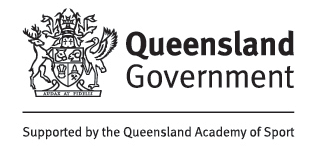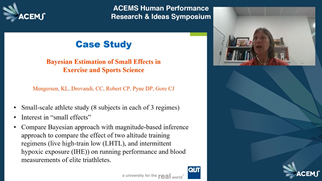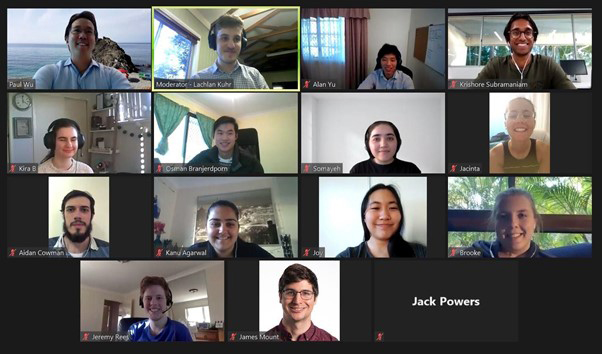
Queensland Academy of Sport (QAS) and Other Sports Organisations
The Queensland Academy of Sport is an initiative of the Queensland Government aimed at supporting the State's elite and identified developing athletes, with the goal of ensuring Queensland remains at the forefront of domestic and international sport. QAS now supports more than 600 athletes across 22 different sports and individual scholarship places. The QAS headquarters include sports training, research, laboratory, medical, and allied health facilities, as well as the first state-based Sport Performance Innovation and Knowledge Excellence (SPIKE) of its kind in Australia.

Overview
QAS has been actively engaged with ACEMS for several years, collaborating via a range of mechanisms including co-supervising postdoctoral researchers, higher degree research students, and more than twenty vacation students. As these collaborations grow, so does the opportunity to involve more ACEMS researchers locally and nationally. QAS has an interest in leveraging ACEMS’ expertise for a range of benefits, including to solve industry problems, improve athlete performance, and better understand and leverage data and analytics in sports. ACEMS collaborations with QAS have also extended to other sports institutes, including the Australian Institute of Sport (AIS), and organisations representing key sports, such as Swimming Australia Limited.
Collaboration Highlights in 2020
- QAS and Swimming Australia
- ACEMS researchers completed collaborative research projects related to swimming relay analysis, swimming winning times, and pacing strategies (preliminary work), in accordance with the ACEMS ICSS project grant. See ACEMS AI Paul Wu’s presentation at the ACEMS Annual Retreat for details.
- New successful ACEMS ICSS application for “Developing Bayesian methods for modelling the dynamics of complex systems in sports: performance vs injuries”, including cash and in-kind co-contributions from industry
- ACEMS AI James Yu has been appointed as a research assistant, to support the ICSS funded research
- A first paper has been submitted for publication based on this research and a second is in preparation
- A contract is being finalised for ACEMS QUT-QAS-AIS co-funded Post-Doc (0.5 FTE) and 3 PhD positions. New opportunities will be advertised for research students in 2021
- Vacation Research Experience Scheme (VRES) students completed projects over the 2019/2020 summer break at ACEMS QUT node
- Two RES students commenced projects over the 2020/2021 summer break at ACEMS QUT node, namely, Jacinta (working on graphic GPU for parallel computation of Bayesian networks) and Bryce (working on algorithms for updating Bayesian networks), and presentations on their work are expected in early 2021
|
Extracts from the letter of support from QAS for the new ICSS project: “Developing Bayesian methods for modelling the dynamics of complex systems in sports: performance vs injuries” |
|---|
|
“The Queensland Academy of Sport (QAS) strongly supports this ICSS project... We consider the proposed research to be innovative and believe the expected outcomes will deliver significant impact to our organisation. … The aim of the research is to explore the possibility of improving methodology in response to the heterogeneity of the athlete performance model. Specifically, the investigation will assess the use of data science methods in relation to injury modelling and athlete performance. Given the multi-faceted nature of injury, the first project will look at methods that may assist in untangling some of this complexity, helping inform aspects of recovery and mitigating future injury risk. The second project will combine triathlon coaching expertise with existing data in an effort to improve predictive modelling, potentially advancing performance outcomes. These projects both offer great possibility from a performance perspective, further educating our staff and building on our organisational knowledge. In the short term, it is anticipated that the outcomes may positively influence preparations for the 2021 Tokyo Olympic Games. In the long term, integrating data science methods may also help address other challenges faced by sports programs, adding a new component to the current problem-solving methodology”. Queensland Academy of Sports |
Engagement Highlights
- QAS was represented amongst the many attendees of ACEMS COVID-19 workshop
- ACEMS researchers engaged in research with QAS and other sports organisations presented at ACEMS Human Performance Research and Ideas Symposium in September, with more than fifty attendees, including others focused on elite sports from academia and industry, and special industry guests from across Defence and DST’s Human Performance Research Network (HPRnet). Watch ACEMS AI Paul Wu’s presentation.
- At ACEMS 2020 Virtual Annual Retreat, Paul Wu delivered a presentation on collaborative research with QAS, supported by ACEMS Industry Collaboration Support Scheme
- Key QAS collaborator, Paul Wu, awarded the ACEMS 2020 Impact and Engagement Award, in recognition of his collaboration with QAS and others
- At the Australian Institute of Sports (AIS) Sports Technology and Applied Research Symposium (STARS) Conference, Paul Wu gave a presentation to the elite sports community, including QAS attendees, and was also part of the expert panel talking about opportunities in sport with data science. In view of COVID-19, proposed workshop aspects of this symposium that ACEMS was going to support were not included.
- A presentation was delivered to the ACEMS QUT Dean Scholars group of students, to promote opportunities for VRES projects with ACEMS and collaborators including QAS
- Industry briefings and research planning meetings were organised with QAS, and other collaborators (including AIS), throughout the year

Watch ACEMS CI Kerrie Mengersen’s talk (including case study from sports research and Bayesian methodologies)

Paul Wu presented to potential VRES students regarding sports-related VRES projects available in 2020/2021 Summer Break
Opportunities for 2021
In addition to ongoing collaborations detailed above, in 2021, ACEMS and QAS (and other collaborators) have outlined new industry-academia research opportunities for research students.